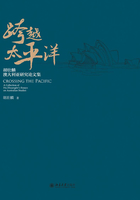
Foreword
Thanks to the School of Foreign Languages,Peking University,for allowing me to step down from my position as Director of Center for Australian Studies,Peking University at the end of 2014 because of my age and health. Thanks also to Peking University's BHP Billiton Chair Professor of Australian Studies David Walker,Professor Liu Shusen and Professor Liu Hongzhong for helping me to get my collection of papers on Australian studies published,a book which records one important aspect of my academic life from 1979 to 2014,and expresses my deep love for this country and the people across the Pacific.
Foreign language circles in China have known me as a“linguist”of Peking University,in the sense of both“a person who knows several foreign languages well”and“a person who studies languages or linguistics”(Oxford Advanced Learner's English-Chinese Dictionary,8th edition,2014),although I see myself only as a life-long learner in these two fields.
How is a“linguist”related to Australian Studies?This is a long story to tell. To cut it short,I was one of the first group of young and middle-aged teachers(known as the“Gang of Nine”in Australia,see Article 8)sent by China's Ministry of Education in January 1979 to receive advanced education in the University of Sydney.Encouraged by Professor Zhao Shikai of the Institute of Linguistics,Academy of Social Sciences,I chose to do linguistics with Professor M.A.K.Halliday in the Department of Linguistics,and also to take some literature courses with Professor Leonie Kramer and Dr.Catherine Runcie in the Department of English.During this period,Professor Zhao persuaded me to write something about linguistics education in Australia(Article 1).The next year,the late Professor Lorry Brown of NSW University and Ms.Dorothy Brown of NSW College of Education guided me to write a paper about linguistic differences in the written English of Chinese and Australian students for an English journal in Hong Kong(Article 2).To speak frankly,I had no knowledge of Australian studies at that time.
In 1988,the First Conference on Australian Studies in China was held in Beijing Foreign Studies University. Seeing that this event was sponsored mainlyby other members of the first group of visiting scholars,I managed to present a paper about the features of Australian English(Article 3)to voice my support,the result of which made me feel very sad.My friends told me later that some participants held the view that this is not a paper about Australian studies.As a result,I had to stop attending the following conferences for about a decade,as I was not well trained in Australian literature.
Since then,I concentrated my mind on teaching linguistics courses and writing linguistics papers in Peking University. After my term of Chairman of PKU English Department was completed,my life suddenly changed.The new Vice Chairman of the English Department,Professor Jin Hengshan and the Department's Australian expert Mr.Tony Gallagher approached me,persuading me to be Director of the planned Center for Australian Studies of the university.Although I tried my best to explain to them that there is a difference between linguistics and Australian studies,they did everything to assure me that this position was only“nominal”and they would do everything themselves for the center.This ended in my acceptation of the Head of the Center for Australian Studies,Peking University beginning from December 1996.
What came next was the 6th International Australian Studies Conference held in Peking University. In the course of preparing this conference,I had a chance to meet Mr.Stuart Simson,Chairman of Australia-China Council.When I reported to him the preparatory work of the coming event,he said something expected and unexpected.What was expected is that he hoped the participants would come from various disciplines of the university.I immediately assured him that my colleagues did approach different departments of the university,such as Department of International Relations,Department of Environmental Science,etc.What was unexpected is that Mr.Simson used an expression:“not too many papers about analysis of novels and poetry.”When hearing these words,I smiled stealthily because I didn't expect those Australian literature scholars in China would share the same fate as I experienced in 1988.However,I knew quite well,without their participation,the turn-up rate of the conference would drop greatly.So I told Mr.Simson that I would put those literature participants in a separate session.Anyway,I myself managed to present two papers,one about education policy(Article 5),and the other about the economic crisis in East Asia(Article 6).
With what I have mentioned above in mind,it would be easier for the would-be reader of this paper collection to understand why a linguist would like to choose topics such as immigration(Article 7),the“Gang of Nine”(Article 8),crimes(Article 9),globalization(Articles 10&11),national identity(Article12),Chinese overseas students(Article 13),U. S.marine deployment(Article 14),and Sydney University's industrial actions(Article 15).Being a visiting scholar in 1979 and the Head of the Center for Australian Studies,Peking University,I should make my contribution to the promotion of Australian studies in China.At this point,I would like to apologize for the poor quality of some papers,especially for missing references in some early-written papers,which I found difficult to re-do in the new century.
Inspired by the notion of multimodality,I attempted to add some photos in most of the articles to help recalling those conferences I was present,and some photos which are related to my experiences in Australia and the university's Australian Studies Center as well. All this has constituted part of my life.
Finally,allow me to express my sincere gratitude to Professor David Walker for writing the preface for this collection of essays. I would also take this opportunity to express my thankfulness to Professor Feng Zongxin of Tsinghua University and Ms.Li Hanbing of Peking University for helping me to convert those pdf-readable texts into word-revisable forms.The book also owes a lot to Professors Hu Wenzhong,Huang Yuanshen,Zhang Yongxian,Du Ruiqing,Zhang Qiusheng,Chen Hong,and Li Jianjun for their contribution of some valuable photos.

Center for Australian Studies,Peking University
February 20,2015